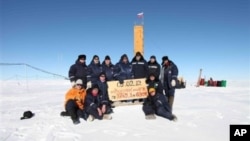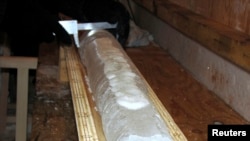A Russian scientist is disputing claims made last week by some of his colleagues that new life forms had been found in water samples from a lake hidden beneath the Antarctic ice sheet for the past 14 million years.
A Russian team was the first to reach Lake Vostok last year, punching through nearly four kilometers of Antarctic glacier after a decade of intermittent drilling. One of the Russian scientists analyzing the water samples -- Sergei Bulat of the St. Petersburg Nuclear Physics Institute -- told the RIA Novosti news agency last week the research team has concluded that the "unclassified" bacterial DNA they found in the lake's icy darkness "does not match any known species in world databases."
But then the head of the Institute, Vladimir Korolyov, told the Interfax news agency that the claim was premature, and that the only life forms they found in the water samples are biological contaminants from either drilling fluids, the laboratory environment or the scientists themselves.
"We cannot say that a previously unknown bacteria was found," Korolyov told the news agency. He added that the Russian team is hoping that newly designed equipment will enable them to extract more reliably pure water samples from Lake Vostok beginning next year.
The discovery of living organisms in the subglacial lakes of Antarctica would help shed new light on how life can survive in extreme conditions -- not only on Earth, but also on distant worlds such as Mars or the moons of Jupiter and Saturn.
British and U.S. research teams have been working to similar ends at other subglacial lakes near the southern pole. The British abandoned their quest last year, but the American team recently drilled through to Lake Whillans and this past February took samples of what they called "living cells" from the icy water. They are still analyzing the find to identify what kinds of bacteria they are and how they manage to live without light or air.
A Russian team was the first to reach Lake Vostok last year, punching through nearly four kilometers of Antarctic glacier after a decade of intermittent drilling. One of the Russian scientists analyzing the water samples -- Sergei Bulat of the St. Petersburg Nuclear Physics Institute -- told the RIA Novosti news agency last week the research team has concluded that the "unclassified" bacterial DNA they found in the lake's icy darkness "does not match any known species in world databases."
But then the head of the Institute, Vladimir Korolyov, told the Interfax news agency that the claim was premature, and that the only life forms they found in the water samples are biological contaminants from either drilling fluids, the laboratory environment or the scientists themselves.
"We cannot say that a previously unknown bacteria was found," Korolyov told the news agency. He added that the Russian team is hoping that newly designed equipment will enable them to extract more reliably pure water samples from Lake Vostok beginning next year.
The discovery of living organisms in the subglacial lakes of Antarctica would help shed new light on how life can survive in extreme conditions -- not only on Earth, but also on distant worlds such as Mars or the moons of Jupiter and Saturn.
British and U.S. research teams have been working to similar ends at other subglacial lakes near the southern pole. The British abandoned their quest last year, but the American team recently drilled through to Lake Whillans and this past February took samples of what they called "living cells" from the icy water. They are still analyzing the find to identify what kinds of bacteria they are and how they manage to live without light or air.








